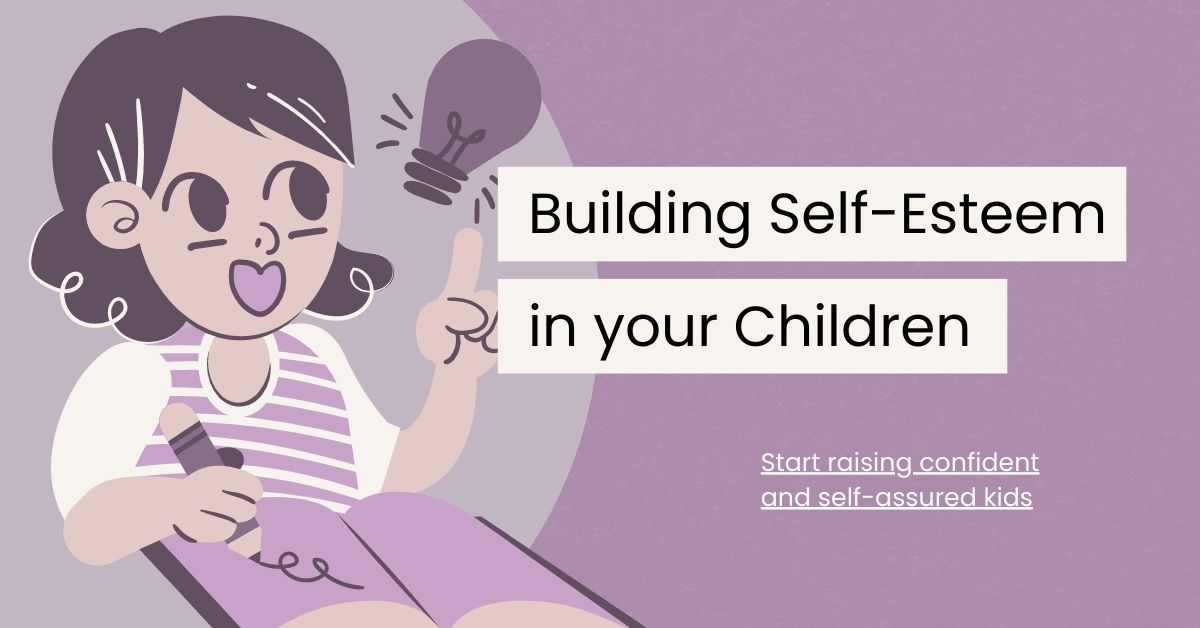Last Updated on July 15, 2023
Want to learn how to successfully build self-esteem in children? Keep reading!
As parents, we share an unwavering desire to see our children thrive with happiness, health, and success. Yet, the journey to raising confident and self-assured kids can sometimes feel like navigating through uncharted waters.
While showering them with compliments is undoubtedly heartwarming, we find ourselves yearning for a deeper understanding of how to truly empower and foster self-esteem in children. Fear not, for I have gathered five mighty strategies that experts recommend to cultivate your child’s self-esteem. So, let’s embark on this transformative adventure together!
Tips for Building Self Esteem in Children
Tip #1: Give Your Child Responsibilities
Ah, responsibilities – those little stepping stones that pave the way to greatness and nurture self-esteem in children. Studies have revealed that children who shoulder age-appropriate tasks from an early age blossom into remarkable adults. But let’s be real, it’s not just about making them do the dishes or sweep the floor. It’s about something much more profound – making them feel valued and heard.
Here are some examples of what responsibilities to give your child:
- Have your child help with simple chores like making their bed or organizing their toys.
- Let them choose between two options for dinner, making them feel like their opinion matters.
- Increase their responsibilities as they grow, such as managing their homework schedule or preparing their own meals.
- Encourage them to take care of their personal belongings, teaching them the importance of responsibility.
- Allow them to contribute to family decisions, like planning a weekend activity, fostering a sense of ownership.
It may seem like a bumpy road at first, with a chorus of whining and complaints. But fear not, for these seemingly small acts of responsibility will transform into invaluable life lessons that your child will thank you for later, all while nurturing their self-esteem.
Tip #2: Create Opportunities for Growth
Witnessing your child flourish in everything they try is the stuff of dreams, right? Well, let’s sprinkle a bit of magic into their journey by nurturing their interests and opening doors to boundless growth, thus enhancing self-esteem in children. It’s like planting seeds of confidence that will bloom into a vibrant garden of self-assurance.
Below are just some of the ways you can create opportunities for your kids to grow:
- Enroll your child in activities that align with their interests, such as art classes, music lessons, or sports teams, to cultivate their self-esteem in children.
- Support their participation in extracurricular activities, where they can explore new skills and make friends who share their passions.
- Help them set achievable goals within their chosen activities, encouraging a sense of progress and accomplishment.
- Expose them to diverse experiences, like visiting museums, attending cultural events, or going on nature hikes, fostering their curiosity and expanding their horizons.
- Encourage them to try new things outside of their comfort zone, like joining a club or volunteering, cultivating their confidence and adaptability.
By embracing their interests and fostering a supportive environment, you’re giving your child wings to soar, helping them unlock their potential and revel in a sense of accomplishment that radiates from within, nurturing their self-esteem as children.
Tip #3: Embrace the Bright Side of Failure
Here’s a secret: even superheroes stumble and fall. Failure, my dear parent, is not the nemesis we make it out to be. It’s a friend in disguise, holding the key to growth, resilience, and the unwavering spirit to try, try again, thus boosting self-esteem in children.
Try the ways below to help your children embrace failure:
- Encourage your child to see failure as an opportunity to learn and grow, rather than a reflection of their worth.
- Share stories of famous figures who faced failures but persevered, highlighting their resilience and ultimate success, promoting self-esteem in children.
- Help your child reflect on what they can learn from their mistakes, fostering a growth mindset.
- Support them in trying new things, even if they might not succeed the first time, promoting a willingness to take risks and developing their self-esteem in children.
- Celebrate their efforts and progress, emphasizing that success is not defined by perfection but by perseverance and growth, fostering their self-esteem in children.
By embracing failure as a stepping stone to success, you empower your child to develop resilience, learn from setbacks, and embrace challenges with a positive mindset, nurturing self-esteem in children.
Tip #4: Praise from the Heart
Ah, the power of praise! It has the ability to uplift spirits, ignite confidence, and make your child’s heart soar. But remember dear parent, it’s not just about the quantity of praise but the quality and sincerity behind your words.
Here are some examples of how to praise your kids:
- Instead of a generic “good job,” offer specific compliments that highlight their efforts and achievements, nurturing their self-esteem as children. For instance, say, “I’m impressed by how carefully you completed your project. Your attention to detail and hard work really paid off!”
- Make eye contact and express genuine admiration for your child’s unique qualities. Let them know you notice and appreciate their individuality. Say something like, “I love how you always show kindness to others. It’s a wonderful quality that makes you shine.”
- Acknowledge their progress and growth by comparing their current accomplishments to their past efforts. For example, say, “I remember when you struggled with this math concept, but look at you now! Your determination and practice have made such a difference.”
- Celebrate their strengths and personal achievements, focusing on their character and values. Highlight qualities like empathy, perseverance, or creativity. Share, “Your compassion and willingness to help others make me so proud. You truly have a heart of gold.”
- Be present and actively engage in their activities, showing genuine interest and enthusiasm. When they share a drawing, ask them about the story behind it and let them know how it captivates your imagination, thus nurturing their self-esteem as children.
By offering heartfelt praise, you create a nurturing environment where your child feels seen, appreciated, and valued, enhancing self-esteem in children. Your genuine words of encouragement become stepping stones to building their self-esteem and fostering a positive self-image.
Tip #5: Steer Clear of Sarcasm
Words have the power to shape worlds, especially in the tender hearts of our children. In moments of stress or frustration, it’s crucial to be mindful of our communication, avoiding sarcasm and hurtful remarks.
Here are some ways you can practice mindful communication:
- Take a deep breath and pause before responding to your child’s actions or behaviors, ensuring your words are thoughtful and compassionate.
- Replace sarcasm with constructive language that focuses on finding solutions. Instead of saying, “Great job breaking another dish,” opt for, “Accidents happen. Let’s clean it up together and find a safe place for fragile items.”
- Use positive reinforcement and encouragement to motivate your child, emphasizing their efforts rather than dwelling on mistakes. Say, “I appreciate how hard you’re working on your homework. Your dedication is truly impressive!”
- Practice active listening and validate their emotions without dismissing or belittling them. Show empathy by saying, “I understand you’re feeling upset right now. Let’s talk about what happened and find a solution together.”
- Model respectful and kind communication, creating an environment where your child feels safe to express themselves without fear of judgment or ridicule, promoting self-esteem in children.
By embracing mindful communication, you create a loving space for your child’s emotional well-being to flourish, nurturing their self-esteem.
Final Thoughts on Building Self Esteem in Children
Building self-esteem in children is a journey filled with empowering moments and meaningful connections. By giving them responsibilities, creating opportunities for growth, embracing failure, offering heartfelt praise, and communicating mindfully, you lay a strong foundation for their self-worth, resilience, and self-esteem.






